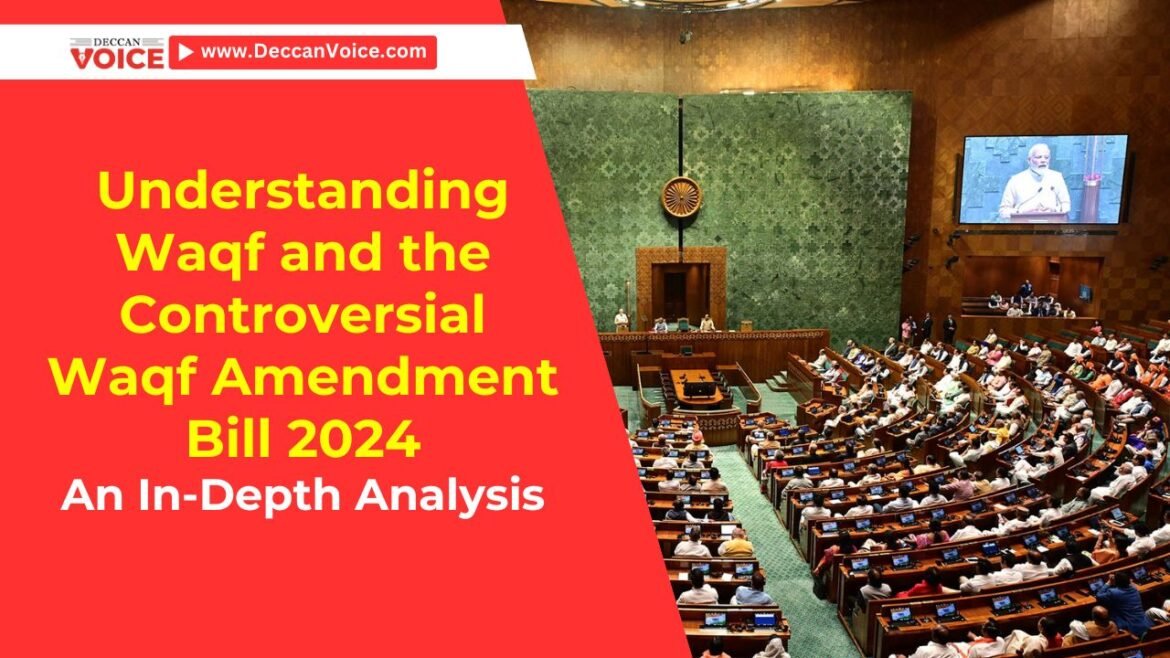Table of Contents
Waqf, an essential concept rooted in Islamic law, is a form of religious endowment where property is dedicated for social, charitable, or religious purposes. The recent Waqf Amendment Bill 2024 has stirred controversy across India, raising concerns about its implications on constitutional rights and the fundamental principles of Waqf. This article delves into the history and principles of Waqf, the key provisions of the new bill, and why it has become a flashpoint of debate.
What is Waqf?
Waqf is a philanthropic practice in Islamic law where movable or immovable property is permanently dedicated for religious, social, or charitable purposes. The individual who dedicates the property (referred to as the Waqif) relinquishes ownership, entrusting it to serve the community indefinitely. Under Waqf, properties can range from land and buildings to other assets, all meant to provide for the welfare of the society, such as building schools, mosques, or hospitals.
Unlike trusts in other legal systems, once a property is declared as Waqf, it cannot be sold, transferred, or inherited. The management of these properties falls under the Waqf Boards, established at both central and state levels, to ensure that the assets are utilized for their intended purposes.
Historical Context of Waqf Legislation
The regulation of Waqf properties in India began with the Waqf Act of 1954, which laid the foundation for the formation of Waqf Boards across states. The Act was designed to manage and safeguard Waqf properties effectively, preventing mismanagement and ensuring the assets were used for community welfare.
Over the years, the Act underwent several amendments, most notably in 1995 and 2013, which sought to address emerging challenges and improve governance. The 1995 amendment introduced the concept of Waqf Tribunals to resolve disputes related to Waqf properties, while the 2013 amendment aimed at enhancing transparency and accountability through digitization and stricter oversight.
The 2024 Waqf Amendment Bill: Key Provisions
The Waqf Amendment Bill 2024 introduces several significant changes that have sparked widespread debate. These include:
- Inclusion of Non-Muslims and Women in Waqf Boards: The bill mandates the inclusion of women and non-Muslims in Waqf Boards, a move that has been welcomed by some as a step toward inclusivity. However, it has also raised questions about why similar provisions are not applied to other religious endowment boards, such as those managing Hindu temples.
- Restrictions on New Converts: One of the most controversial aspects of the bill is the provision that prevents individuals who have recently converted to Islam from dedicating property as Waqf for a period of five years. This restriction is seen as a violation of fundamental rights, particularly the right to freedom of religion.
- Greater Government Control: The bill proposes to shift several powers from the Waqf Boards to government-appointed collectors, including the authority to survey and manage Waqf properties. Critics argue that this increases governmental control over Waqf assets, undermining the autonomy of the Waqf Boards.
- Changes in Legal Jurisdiction: The amendment alters the finality of decisions made by Waqf Tribunals, allowing higher courts to review and overturn tribunal rulings. This change is seen as undermining the efficiency and authority of the Waqf Tribunal system.
Why is the Bill Controversial?
The Waqf Amendment Bill 2024 has been criticized on several fronts, with opponents arguing that it is both anti-constitutional and discriminatory. Here are the main points of contention:
- Violation of Constitutional Rights: The bill is seen as infringing upon Articles 14 (Right to Equality), 15 (Prohibition of Discrimination), and 25 (Freedom of Religion) of the Indian Constitution. By imposing restrictions on new converts and increasing government control, the bill is perceived as limiting the religious freedom and autonomy of the Muslim community.
- Discriminatory Provisions: Critics argue that the bill’s selective inclusivity—mandating the inclusion of women and non-Muslims only in Muslim Waqf Boards—raises questions of fairness and equality. The bill does not apply similar rules to other religious endowment boards, which is seen as discriminatory.
- Threat to Waqf Autonomy: The shift of power from Waqf Boards to government-appointed officials is seen as a direct threat to the independence of Waqf institutions. This change could lead to increased governmental interference in religious matters, which is a significant concern for many in the Muslim community.
- Impact on Religious Endowments: The bill’s provisions could potentially discourage the dedication of properties as Waqf, particularly among new converts to Islam, thereby impacting the future of religious endowments in the country.
Conclusion
The Waqf Amendment Bill 2024 is a complex piece of legislation that has far-reaching implications for Waqf properties and the Muslim community in India. While it includes provisions that aim to modernize and improve the governance of Waqf assets, it also raises significant concerns about constitutional rights, religious freedom, and the autonomy of Waqf institutions. As the debate continues, it is crucial to balance the need for reform with the protection of fundamental rights and religious practices.



